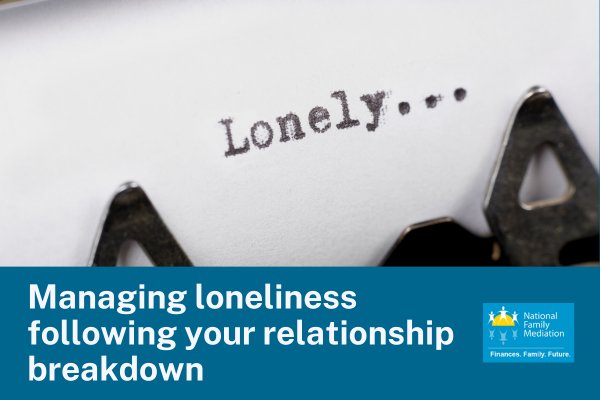Separation or divorce can be a very traumatic event in a person’s life and the end of a relationship often means that people sever relationships that were once important to them, which can leave many feeling isolated and lonely. Equally taking care of young children alone, when you once had a partner to offer support, can be very tough.
Our CEO Jane Robey, offers some advice to anyone who is experiencing loneliness as a result of a relationship breakdown.
It’s OK not to be OK
Separation or divorce can be very traumatic. The end of a relationship can leave many feeling isolated and lonely, as well as the responsibility of caring for young children alone.
However, acknowledging how you are feeling and finding someone to talk to can help. Try talking about how you are feeling with a close friend or family member. We know this isn’t always possible, but there are also charities that can offer you additional support such as Gingerbread. Or consider signing up to a local group where you can meet others in a similar situation.
Embrace Change
If your children are getting a little older, or if their routine and needs change which is adding to your sense of loneliness, then you may benefit from a different child arrangement.
Remember what works one year, may not work the next so don’t be afraid to ask for a change to better meet your circumstances.
It’s important to know that just because you agreed something at the time of your relationship breakdown, it isn’t set in stone for life.
Consider talking to your ex-partner, or you can come to family mediation to agree new arrangements. 35% of the enquiries we receive at NFM are from families whose circumstances have changed since their initial parenting plan was put in place.
A problem shared is a problem halved
People often associate loneliness with being alone, but that isn’t always the case. Many people who are divorced or separated can feel lonely because of the sense of having to make every decision alone. Everyday decisions like what to give the children for dinner or which park to go to can feel overwhelming if you don’t have someone to bounce ideas off or occasionally give you a break.
As the old saying goes – a problem shared is a problem halved. Find someone you can talk to, it may feel silly asking a friend whether you should cook Kiev’s or Spag Bol, but you might find it really helps. You could even invite them round to join you.
Be prepared to talk
If you feel that a small change to your current routine would help you tackle your sense of loneliness, but you cannot approach your ex-partner, then mediation could help.
A mediator is there to help you work through your disagreements and help you turn your arguments into agreements and to find solutions that work for you both. Even if you already have a child agreement in place, you can still use mediation to discuss changes that might help you feel less lonely.
Currently, for those couples who want to discuss children matters, there is the Family Mediation Voucher Scheme worth £500 to go towards mediation. To find out more about how you access this get in touch or book an appointment with a family mediator.
Don’t be afraid to get additional support
If you continue to struggle with loneliness and it is affecting your mental health, then there is help available. The Mental Health Foundation lists a number of charities and NHS organisations that can offer support. Don’t suffer alone.

